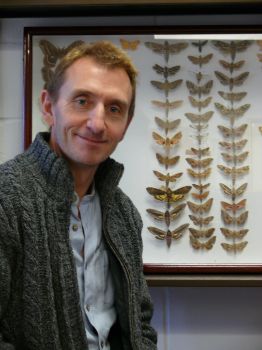Bumble bee expert’s ‘life scientific’ began with a macabre interest in road kill
By: Jacqui Bealing
Last updated: Friday, 7 November 2014

Professor Dave Goulson
A second Sussex academic is to be profiled in the current series of BBC Radio 4’s top science programme, ‘The Life Scientific’.
Professor Dave Goulson, whose main academic focus is the ecology and conservation of bumble bees, discusses his lifelong obsession with wildlife with the show’s presenter Jim Al-Khalili on Tuesday (11 November) at 9am.
Professor Goulson, author of a popular science book about bumble bees, A Sting In the Tale, which was shortlisted for the 2013 Samuel Johnson Prize for Non-Fiction, describes how, as a child growing up in rural Shropshire, he tried to emulate naturalist Gerald Durrell by collecting all manner of creatures and keeping them in his bedroom.
He developed a slightly macabre interest in animal anatomy, dissecting road-killed animals in his back garden, and even experimented with taxidermy, producing a selection of ineptly stuffed squirrels, ferrets and foxes, which his parents banished to the shed because of their awful smell.
His passion for wildlife, particularly for insects, inevitably led to a career in biology, where he has become a leading expert on bumblebees and pollination. In the radio programme he explains about his founding of the Bumblebee Conservation Trust, a charity devoted to saving his beloved bumblebees, and talks about the many perils they face in the modern world.
One of these perils is the widely used group of pesticides known as neonicotinoids, which Professor Goulson’s research has linked to bumblebee declines. This has led to him becoming embroiled in a murky world where science, politics and big business collide, and in a controversy that remains unresolved, in which he has become an campaigner for more sustainable farming.
Professor Goulson also talks about his farm in France, and his attempts to turn it into a flower-rich nature reserve where bumblebees and other wildlife can thrive.
This story is the subject of his most recent book, A Buzz in the Meadow, in which he also highlights the importance of biodiversity to the future well-being of humans, from the bees that pollinate our crops to the worms, woodlice, flies and beetles that recycle nutrients, dispose of dung and perform a myriad of other vital tasks.
Last month, Sussex AI expert Professor Margaret Boden was profiled on ‘The Life Scientific’. The episode is still available on BBC iPlayer.
